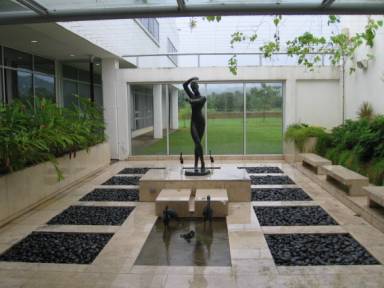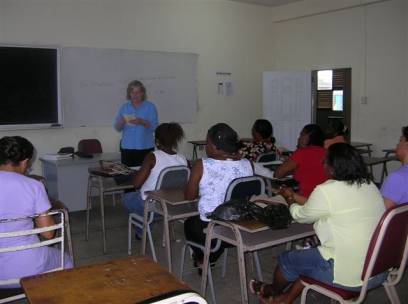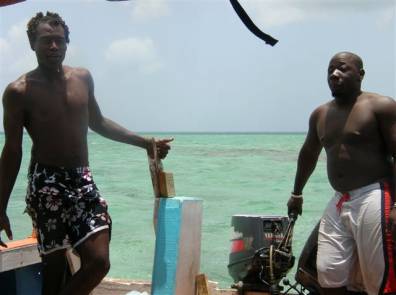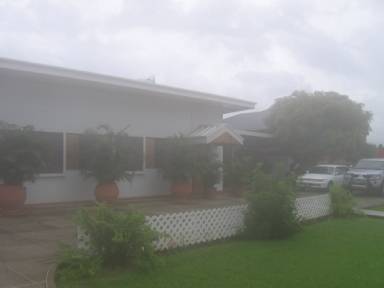International Research and Theory in Human EcologyVol. 18, No. 1
|
|
Interested in submitting an article to KON FORUM? Papers are now being accepted for review. |
|
Kappa Omicron Nu
|
Figure 4. Low-income house near UWI campus. |
Figure 5. Upper middle-income house near UWI campus |
In anthropology a key component of much of the research is observation from fieldwork. Observation has implications; interpretations and analyses of events arise out of the interplay of the visitor’s voice and the voices of informants, family members, or employees (Birth, 1999, Yelvington, 1995). In Kevin Yelvington's book entitled Producing Power, he reveals the strains between employers and employees and vividly portrays women as social agents working under the constraints imposed by economic and political forces.
The nuances of women’s and families’ behavior directly observed give life to statistics and government data. Comments from taxi drivers, children at the end of their school day, stressed out young mothers trying to reach their next appointment, college students in the classroom, wives buying brown eggs and fresh fruit at a farmer’s market, husbands on their way to pick up Valentine’s gifts for their wives—all contribute to a picture of daily life. Nothing in a recipe book or cooking show is as compelling as watching a woman use a 40-year-old mixer attachment to shred a mound of coconut for a sugar cake for a church fete or watching a man split coconuts open with a machete or another frying fish on a piece of metal over an open fire or men weaving in and out of traffic selling pineapples at the end of the workday. Students can add to these daily life observations and discussions by developing case studies of typical families (Goldsmith, 2008).
As in any developing country, Trinidad and Tobago is a mix of the old and the new. The latest cell phones and rusty kitchen appliances were used side by side. To go back to Friedman’s comment, there is no question that Trinidad and Tobago is well connected to the outside world. In 2006 there were 910,000 cell phones for the aforementioned 1.3 million populace. The rapid adaptation of cell phone technology would be a worthy research study as well as an investigation into the adaptation of other household or personal use technologies.
Cable TV with American channels and the BBC is widely available. The UWI campus and urban areas have Internet access although service can be spotty. Most children are brought up with Sesame Street. American music plays on radio stations along with local calypso and steel band music. There are 35 radio stations. Music is everywhere from the opening of grocery stores to restaurants and the airport. The proliferation and originality of the music and the yearly celebration of Carnival are unique to their culture.
What is surprising is the mix of North American and English ways with island ways. What we would call french fries in the United States are called chips after the British way. The steering wheel is on the British side of the car and the accents are decidedly UK-influenced.
A large number of residents have relatives in the United States, Canada, and the United Kingdom and regularly visit their relatives. Many residents take full-time employment in these countries because wages are better especially in the health, hospitality, and service fields. In the Miami and Ft. Lauderdale areas over 100,000 Trinidadians reside and work. A flight to Miami is a normal course of life to visit with family and friends and to shop. Another location with strong cultural ties is New York City (Bureau of Western Hemisphere Affairs, April 2001, p. 5).
There are no Wal-Marts, Home Depots, or McDonalds in Trinidad and Tobago, although there are Subways and Kentucky Fried Chicken (KFC). KFC is so popular that the Port of Spain’s KFC is the number one such retail outlet in the world. In 2008, there were 71 KFC restaurants in Trinidad, including in the airport.
The Issues
As mentioned in the abstract, the article now turns to a discussion of the economy in transition and sustainability of culture and globalization. These subjects were selected in consultation with professors in the Department of Agricultural Economics and Extension at the University of the West Indies.
Economy in Transition
Trinidad and Tobago is a country in transition, and with growing pains come issues that need to be illuminated and discussed. It is not a poor country relative to others in the Caribbean; in per capita income, it ranks only behind Barbados.
Because economies and education are linked, it should be noted that the literacy rate is 98 percent with attendance in school up to the 8th grade compulsory. The educational system is strongly influenced by the British system. For example, external examiners are used for college level courses, which means theses, dissertations, and some of the exams are sent to other countries for grading—most commonly the United Kingdom, the United States, and Canada (Goldsmith, 2004). As another example, many students go on to graduate school in one of these three nations, and British students have a cooperative agreement that allows them to attend the University of the West Indies, which has a medical school. UWI is the largest university with over 14,000 students; it has nearly doubled in enrollment in the last five years, an example of rapid growth.
In January 2006, a law was passed that provides free (for the most part) college education to undergraduates so the expectation is that enrollments will increase significantly. This leads to strain on the resources of the universities (besides UWI, there are the University of Trinidad and Tobago and the University of Southern Caribbean). Issues include faculty teaching loads and the number of courses, classrooms, internships, and dormitory rooms.
Human ecology professionals from Canada and the United States have been brought in to address these problems, most particularly curriculum issues that can also be seen as opportunities for a country in transition. Education is a highly regarded value in the population; everyone wants children to succeed and teachers and professors are highly respected. At UWI small classes and one-on-one instruction through research projects and directed individual studies are giving way to larger lecture classes.
During 2004-2006 in the United States, the inflation rate averaged 2.7 percent; inflation in Trinidad and Tobago was much higher. For example in 2005, food costs rose 22 percent in Trinidad and Tobago. The average family income in 2005 was $7,709.00 (Central Statistical Office, online March 23, 2006). The minimum wage was $1.50 an hour. It should be noted that the aforementioned Subway sandwiches and Kentucky Fried Chicken sell at similar prices to those in the United States, where the minimum wage is $5.85 an hour. So teenagers and college students who want these foods are strained to afford them, and their families feel the pinch. As may be expected, high prices relative to income are hardships to families.
Concerns about inflation, consumption patterns, and economic trends are of interest to human ecology professionals and fall under the umbrella of quality of life. “Poverty means bad or insufficient food, unhealthy living conditions, and endless other factors that lead to illness. Yet it is not merely that poor people tend to be unhealthy while everyone else is well. When you examine socio-economics status (SES), a composite measure that includes income, occupation, education, and housing conditions, it becomes clear that, starting with the wealthiest stratum of society, every step downward in SES correlates with poor health” (Sapolsky, 2005, p. 94).
In economic theory, individuals choose purposefully to get the most from their limited resources (Gwartney, Stroup, Sobel, & Macpherson, 2003). Sherman Hanna says that, “The most obvious application of economic theory to family resource management is in terms of the maximization of satisfaction or utility subject to resource constraints. The potential of the economic framework is very wide, extending to all consumer purchases of products and services and also including labor force, fertility, and even marriage decisions” (1989, 1997).
The study of how rising prices affects families and households has worldwide implications. For example, Joshi and Gandostra (2006) examined how Indian urban households coped with rising prices over the period 1995-1996 to 1999-2000. They observed that rational responses of households played an important role in coping with increased cost of living. Economic theory assumes that individuals and families seek to maximize satisfaction from the decisions that they make. It also assumes that people are rational—that they will use reason to achieve the best outcomes as evidenced by the Joshi and Gandostra study.
A related economic/resource management concept is optimization. Human ecology professionals Holly Hunts and Ramona Marotz-Baden say, “Optimizing means that all assessment tools are considered in the search for the best choice. An optimizing search is thorough, and the choice that meets the assessment tool standards of high quality while considering cost is the choice made. . . . Optimizing is possible when time is not limited and when true quality can be measured” (2003, p. 5).
As mentioned earlier, Trinidad and Tobago is considered to have one of the strongest economies in the Caribbean because of its oil and natural gas base. The U.S. is a major market. Agriculture, which includes sugar, cocoa, citrus, and poultry, makes up 2 percent of the gross domestic product (GDP). Tourism is 3.4 percent of the GDP. Industry is 8 percent. Most of the rest of the GDP falls under services, hydrocarbons (crude oil, natural gas, and petroleum products), and asphalt.
The Trinidad and Tobago economy experienced growth from 1998-2006 on the heels of eight years of economic decline. Unemployment ranged between 8 to 10.2 percent depending on the specific year (Central Statistical Office, www.cso.gov.tt, March 23, 2006). The Central Statistical Office (CSO) is the source of all official statistics and is officially charged with the responsibility for compiling statistics over a broad range of subjects including the population censuses, agricultural, economic, and social statistics for the purpose of servicing the needs of government, the business and social community, and international organizations. In conversations with the CSO and the citizens, they would naturally like to bring this unemployment rate down. In classic economic terms, one of the characteristics of a depression is an unemployment rate of 10 percent or more.
To go back to the connection between economics and education, locals explain that there is a disconnect between the education of the students and the realities of the job market. There is a shortage of persons in the skilled building construction trades so that it is difficult to get buildings and homes finished. Half-built homes are in evidence because of this and also because of the Indian tradition of building room by room as one can afford it versus having a mortgage. In a nation as small in size as Trinidad and Tobago the opportunities for a wide range of employment is limited.
Disliking owing money, fear of investing in the stock market, and the evils of credit cards are topics citizens of Trinidad and Tobago talk about. They hesitate before going into debt and prefer to pay cash. As they travel more and become more globalized, they are learning to rely more on credit cards. Depending on your point of view this may be a good or a bad trend.
Land costs are rising steeply so one-story houses are being turned into two and three story houses in neighborhoods which formerly were predominantly one-story house neighborhoods. A tradition in India–origin households is for a young married couple to live downstairs and their parents to live upstairs in a two-story house. It is also common for families to stay in the same house for many years and commute over an hour to jobs in the city and on campus.
Families, Households, and Stress Management
The booming economy, high inflation, and moderate to high unemployment are stressors for families. Stress refers to the nonspecific response of the body to any demand made upon it (Seyle, 1974). “It usually involves a state of tension and is considered a process rather than an end state. Stress can spring from relational and environmental sources. It is culturally and personally defined so that what may be stressful to one individual may not be stressful to another” (Goldsmith, 2007, p. 158).
Stress can come from a variety of sources internal to the individual (like worrying about an upcoming exam) or external such as crime or a negative working environment. Stress can pileup, and overload can be experienced. In a UWI class, students expressed a lot of stress from internal and external sources, much of it having to do with time management. “Not enough time is a perennial stressor” (Goldsmith, 2007, p. 159).
As mentioned earlier, cell phones are pervasive. Harvard Professor Tal Ben-Shahar says, “Cell phones, e-mails, the information highway—the overall rising complexity of modern life—all contribute to the constant time pressure and to the experience of potentially enjoyable activities as distracting. When there are too many competing demands on our time and attention, our ability to be present is diminished—and with it, our ability to appreciate and enjoy the experience” (2007, p. 152).
Older adult students with children said their families were causes of stress—trying to get children to school, help them with their homework, dividing work tasks in the home, and so on (Goldsmith, 2008). “Family stress is an umbrella term referring to a variety of stressors arising from relationships and the problems inherent in trying to meet child care, elder care, one’s own needs and desires, spouse’s needs, etc. Family stress is about relationships and extends beyond the immediate family to include managing outside activities such as school events and sports/recreation” (Goldsmith, 2007, p. 160).
In Trinidad and Tobago, a particular stressor for families is crime that has risen in recent years. Stressors can be categorized as relational or environmental (Goldsmith, 2005). The amount of violence affects individual consumer and family behavior, the type of housing that is built, and how it is protected. Guard dogs are common, as are bars on windows, high fences, and numerous locks and gates. Twenty-four hour security guards are in evidence in high-end house compounds and in neighborhoods. Barbed wire and walls surround the UWI campus, and each entry gate has uniformed guards. Faculty, staff, and students do not simply walk on and off campus, they go through the gates. Armed robberies, home invasions, and car and residential burglaries are high and threaten everyone regardless of location or social class. Kidnappings, mostly of wealthy businessmen or their families, are well publicized.
According to McGregor (2005), a culture of peace represents an everyday attitude of non-violence and a fierce determination to restore a sense of security and human rights. A shared vision of peace would include mutual support and a constant striving for justice, freedom, and equality. The family is fundamental in making this change for the better.
Another stressor on the family is the importation of illegal drugs. There is a zero tolerance policy regarding the possession of illegal narcotics or drugs for the purpose of trafficking, ingestion, or transport. Drug laws and penalties are severe. However, because they are island nations, it is difficult to keep drugs out. The locals say that many of the crimes have as their base drug addiction and the need for money to fuel that addiction. The high unemployment rate is another reason behind the rising crime rate. Students in family resource management classes also cite the lack of supervision of youth in the home has led to crime involvement.
Living in an atmosphere of crime and violence is undoubtedly a stressor for families, and safety is a constant topic of discussion between persons and in the news. How families adapt, and in particular how they cope with stress overload in regard to crime, would be a worthwhile subject for future research studies.
Sustainability and Globalization
Sustainability refers to meeting the needs of the present without compromising the ability of future generations to meet their needs. It implies a commitment to the health of a nation and a belief in its capacity to improve over time. This includes sustainability of families and economies as well as the environment and of the culture overall. How does one sustain what makes a country unique while at the same time join in global cultural exchange and trade?
How does one make decisions leading to a desirable future? In our role as human ecology professionals, how does one improve humanity? Although we must respect the differences between cultures we cannot ignore the enormous impact of globalization.
Globalization is defined as the distribution of goods and services worldwide so that consumer goods eventually become universally accepted and homogeneous. The consumer-marketplace interface is at the core of this exchange. Sometimes there are barriers to free exchange besides tariffs. “Consumer ethnocentrism indicates a general proclivity of buyers to avoid all imported products irrespective of price or quality considerations due to nationalistic reasons. Consumer ethnocentrism can be institutionalized in the form of an informal government procurement policy that unduly favors domestic companies” (Kotable & Helsen, 1998) or can be a prevalent as “a general societal tendency” (Shimp & Sharma, 1987) (Shankarmahesh, 2004, p. 194). This differs from a global perspective that “entails the challenging of materialism and commercialism and an examination of one’s role as citizen” (Erasmus, Kok, and Retief, 2001, p. 116). Global perspective is an attitude or a way of thinking. How will this decision affect not only my own nation but other nations? How are small businesses including home-based businesses encouraged?
The Republic of Trinidad and Tobago is in the throes of sorting out sustainability, consumer ethnocentrism, globalization, and the global perspective due to rapid growth and a mix of small and large businesses, local to multi-national (i.e., Nestle, DHL, Johnson & Johnson). Consumer attitudes are expected to change over time.
An example of a local versus global product is the Trinidadian sweet drink (carbonated beverage) industry described by Daniel Miller in his book Capitalism: An Ethnographic Approach. On the local front, Solo Beverages is the core producer founded in 1941 and there is a strong nostalgic identification with the full range of fruit drinks and colas, most notably Apple J. Other local companies making soft drinks are Cannings, S. M. Jallel, and more minor players. International companies include Pepsi and Coca-Cola. The introduction of the fast food industry from outside has brought along with it more sales of Pepsi and Coca-Cola. The feeling of nostalgia for Solo will continue because “its longevity may lie in the observation volunteered by several informants that this is the very bottle with which a generation of Trinidadians were given milk as babies!” (Miller, 1997, p. 149).
Summary and Research Implications
This article reported on the collaboration of two professors who explored the family and economic changes occurring in Trinidad and Tobago from a human ecology perspective. This collaboration led to many insights and the need for more research on the impact of a rapidly changing economy on the population. The booming economy has brought stresses to the families, households, and schools, including the University of the West Indies.

Figure 6. Atrium in new high-tech UWI building, Summer 2008
Issues of sustainability of culture and of globalization were discussed. How does one maintain culture while at the same time expand to include outside forces? This is a fundamental question all nations and regions are facing and food for thought for human ecology leaders.
McGregor says, “We are challenged to never lose sight of the whole while we deal with complex social issues” (2005, p. 4). More studies of time management and family stress are needed. And these studies should include an examination of impacts on different age and income groups.
The UWI thesis cited earlier about the rural elderly in Trinidad lays the groundwork for many more research projects on the subject of aging. For example, it is not unusual for those who have spent decades in other countries to return home to Trinidad for their retirement years. The reasons given were that this was indeed their home with long-time friends and family, that the tropical climate was preferred, and that their pensions and money saved would go much further in Trinidad than where they had worked all those decades. Many were building “dream” houses. This adjustment back into the culture and “going home” would be an excellent subject for study.
Endnote
1The official source of statistics to be used throughout this article unless otherwise noted can be found at www.cso.gov.tt.
References
Ben-Shahar, T. (2007). Happier. NY: McGraw Hill.
Birth, K. K., (1999). Any Time Is Trinidad Time: Social Meanings and Temporal Consciousness. Gainesville: University Press of Florida.
Bubolz, M. & Sontag, S. (1988). Integration in home economics and human ecology. Journal of Consumer Studies and Home Economics, 12, 1-14.
Bureau of Western Hemisphere Affairs, U.S. State Department Report on Trinidad and Tobago, April 2001, p. 5.
Central Statistical Office, The Government of the Republic of Trinidad and Tobago, Ministry of Planning and Development, Reports available online on demographics and households age distribution at www.cso.gov.tt.
Erasmus, Kok, & Retief (2001). Adopting a global perspective in the discipline consumer science. Journal of Family Ecology and Consumer Sciences, 29, 116-23.
Friedman, T. (2005). The World Is Flat: A Brief History of the Twenty-First Century. New York: Farrar, Straus and Giroux.
Francis-Granderson, I. (2008). Labour Productivity, Nutrition, Health and Housing Statuses, among Rural Elderly in Trinidad. Unpublished Ph.D. Thesis, Department of Agricultural Economics and Extension, The University of West Indies.
Goldsmith, E. (2004). Co-operation and collaboration between the United States and the Caribbean. Proceedings of the XXth International Federation for Home Economics Congress in Kyoto, Japan.
Goldsmith, E. (2005). Resource Management for Individuals and Families, 3 rd edition, Belmont, CA: Wadsworth.
Goldsmith, E. (2007). Stress, fatigue, and social support in the work and family context. Journal of Loss and Trauma, 12(2), 155-169.
Goldsmith, E. (2008). “Trinidad and Tobago: Case Studies of Families and Consumers in an Accelerating Economy” in the e-book Global Sustainable Development: A Challenge for Consumer Citizens. International Federation of Home Economics XXI Congress, Lucerne, Switzerland.
Gwartney, J. D., Stroup, R. L., Sobel, R. S., & Macpherson, D. A. (2007). Economics: Private and Public Choice, 11 th edition, Mason, Ohio: South-Western.
Hanna, S. (1997). Optimization for family resource management. Proceedings of the Southeastern Regional Family Economics/Home Management Association.
Hunts, H., & Marotz-Baden, R. (2003). Family systems theory, a new look at an old friend. Consumer Interests Annual, 49, 1-13.
Joshi, S. & Gandotra, V. (2006). Rising prices and coping strategies of urban families in India. International Journal of Consumer Studies, 30(1), 55-63.
Kotable, M., & Helsen, K. (1998). Global Marketing Management. New York: John Wiley & Sons.
McGregor, S. (2006). Transformative Practice: New Pathways to Leadership. East Lansing, MI: Kappa Omicron Nu.
McGregor, S. (2005). Transdisciplinary and a Culture of Peace. Culture of Peace Online Journal, 1(1), 1-12.
McGregor, S., & Goldsmith, E. (1998). Expanding our understanding of quality of life, standard of living, and well-being. Journal of Family and Consumer Sciences, 90, 2-6, 22.
Miller, D., (1997). Capitalism: An Ethnographic Approach. Oxford: Berg.
Sapolsky, R. (2005, December). Sick of poverty. Scientific American, 93-99.
Seyle, H. (1974). Stress without distress. New York: New American Library.
Shankarmahesh, M. N. (2004). Consumer Enthnocentrism: Properties, Antecedents, Consequences and Implications for Global Marketing Strategy. Proceedings of Advances in Marketing: Concepts, Issues and Trends. St. Petersburg Beach, Florida, p. 194.
Shimp, T. A., & S. Sharma (1987). Consumer Ethnocentrism: Construction and Validation of the CETSCALE, Journal of Marketing Research, 27 (August), 280-289.
Yelvington, K. (1995). Producing Power: Ethnicity, Gender, and Class in a Caribbean Workplace. Philadelphia: Temple University Press.




